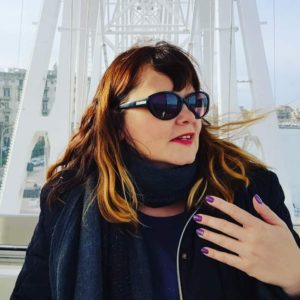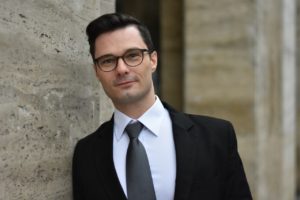A good speech must be simple and personal. The audience can imagine that they are in your shoes. If you want to be a better communicator you have to practice a lot. This is what Alex MacIntosh believes. He is a member of Budapest Toastmasters. I am sure he has many interesting personal stories because if we imagined his life as a book, it would have many chapters about his homeland Canada, and also about his travels. A long chapter for South Korea, where he was living for 9 years as an English teacher, and a short chapter that started recently in Budapest.

SZV: When did you deliver your first icebreaker speech? What was it about, and why did you choose that topic?
AM: I delivered my first speech in South Korea in 2014. As an icebreaker speech it was about my life. I used FAQ’s that I get all the time and made them part of my speech. I wrote down those questions, I cut them up and put them in a hat. I walked around the audience and one by one, members would pick one and ask me.
SZV: What was the first question from the list? Can you remember?
AM: Yes, I can remember few of them. Why did you choose Korea? What was the best trip you’ve been on? Is Canada cold?
SZV: Why did you join Toastmasters?
AM: I was always interested in communication because I am a teacher. I thought Toastmasters would help me become a better teacher. I was right, it helped me a lot.
SZV: When you talk in front of an audience what is the biggest challenge for you?
AM: I gave more than 50 speeches and my biggest challenge continues to be keeping eye contact and keeping the audience engaged. If you have a small audience, paying attention to the same amount of eye contact with everybody that’s not easy.
SZV: What do you do if somebody is not watching you, maybe looks bored?
AM: I try to put more energy to my speech, keep eye contact with those people or ask a question from the audience.
SZV: What do you advise those who are struggling with stage fright?
AM: I recommend practicing with the video function of camera. When you watch yourself it can be uncomfortable but you will have more control over how the audience see you. I think the reason for stage fright comes from the fact that we feel we cannot control our movements and our voice in front of the audience. So many people worry about it. If you pay attention, you can present yourself better. It helps a lot. Practice with video is what I recommend. Start to do this 4 or 5 days before the speech. It can be the part of the preparation.

SZV: How do you choose a topic for a speech?
AM: I have a collection of S.E.E.D stories S for Short, E for Easy, E for Eventful and D for Descriptive. I sit down and think about my personal stories that I have. It must be short. If a speech is 7 minutes I am looking for a story which is 3 minutes long. It also needs to be tell easy which means a story with not too many characters and locations. The story needs to be eventful. For example: something that has changed my mind, or how I see the world. Try to find AHA moments. Finally, descriptive things like texture, temperature, smells, etc. When introducing characters, include one sentence about how they look and one sentence about their personality.
SZV: Who is the best TED or Toastmasters speaker for you?
AM: I really like Mohammed Qahtani and Dananjaha Hettiarachchi.
SZV: You are a member of the Budapest Toastmasters Club. How many people are you mentoring?
AM: I have signed up for the mentoring program and I am waiting for them to reach out to me. It is the way our mentoring program works. When mentees need help they can approach me. At the moment I am mentoring 3 people but unfortunately they are not too active.
SZV: What is the first thing you teach as a mentor?
AM: The first thing I teach is that when you come up with an idea for a speech it has to be a gift for the audience. Not a kind of therapy for the speaker. I see it a lot with new Toastmasters.
They want to tell a story for their benefit. They feel they need to talk about some tragedy that happened in their life. These stories are not good choices because the audience feels that they are not part of it. After a good speech the others will grow and change. So respect the audience’s time and give them something. The benefit for the audience is the message and the lesson of the speech. The benefit for the speaker is that they have a chance to go on stage.
SZV: If somebody asks you the question ‘why should I develop my public speaking skills?’, what would you answer?
AM: It affects many different areas of your life for example: professional and family life, you will be more effective. You will chose your words carefully and you will speak confidently in front of other people so it will give you confidence to every part of your life.
SZV: You won two prizes last November at our speech contest.
How has your life changed since then?
AM: Yes, I won two prizes, one for table topics and one for tall tales. It was a good feedback for me and next time I would like to do better. I am happy I can learn more.
SZV: What’s your secret dream with public speaking? Where do you see yourself in 5 years?
AM: I have never really thought about a TED talk but it would be amazing. I really enjoy to teach public speaking because I see the effects and I can help make improvements in a short time. For example, those people who are so nervous to speak in front of others.
SZV: When you see a speaker on stage, what is the first thing you look at?
AM: Body language, posture, what they are doing with their hands and if they smile or not. Kind of getting an idea who they are.
SZV: A good performer like … How would you finish this sentence?
AM: A good performer was the singer Prince. He was one of the best performers. But if we talk about public speakers Mohammed Qahtani is the best. I like his voice control, body language and movements.
SZV: What were the mistakes you corrected first as a speaker?
AM: I stopped looking at myself as a performer in theatre. I think public speaking is more like a conversation, not like a performance where it’s a one person play. I have a dialogue with the audience and I care about them.
SZV: What was the worst/and the best experience on stage for you?
AM: The worst was in South Korea, where we used to meet in a pub for the Toastmasters meetings, and we usually were drinking not after but before and during the meeting. Crazy things can happen. It was fun and we had a wonderful time. The club name was Roastmasters. There are two clubs like this, one in Hong Kong and one in South Korea. They have the meetings with beer.
Winning feels good. When I won first prize in table topics at the gala last November, it was the best moment and experience for me on stage.
SZV: What do you think about just before you go on stage?
AM: I try to clear my mind, focus and relax. Because one or two hours before the speech you can not do anything. It is too late. It’s better if you prepare your speech earlier so it will make you confident.
SZV: Imagine the situation that from tomorrow you never deliver a speech again. What would you miss?
AM: I would miss the exciting feeling of standing in front of the audience and delivering a message. It used to scare me to deliver a speech but now it energizes me. So I would miss this energy.
